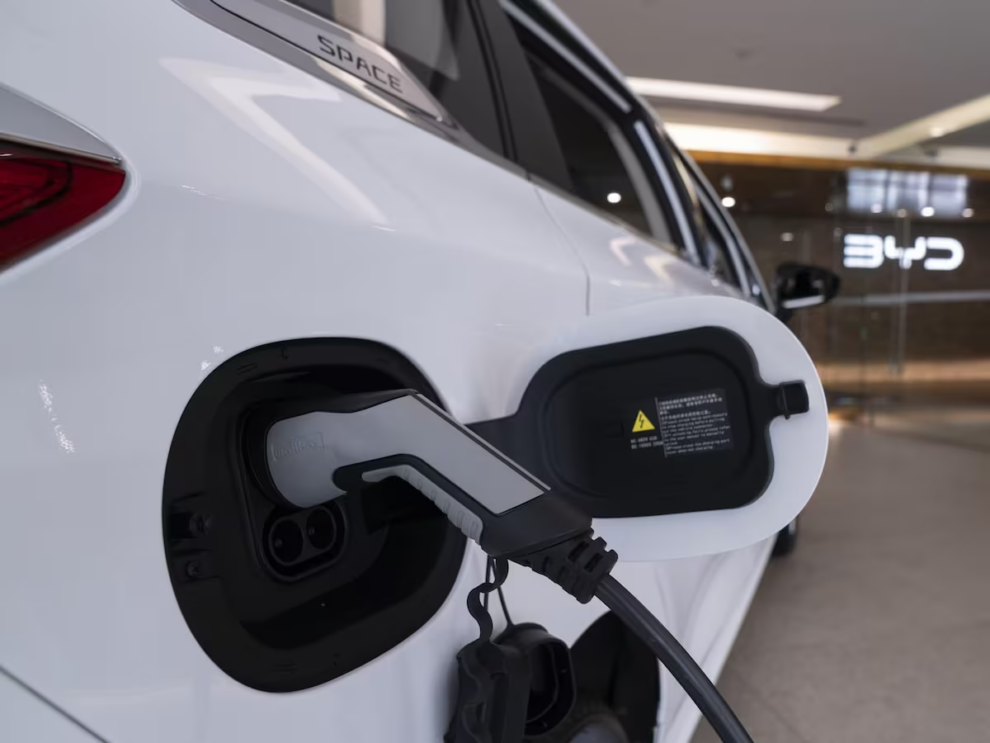As the automotive industry accelerates towards sustainable solutions, the popularity of electric vehicles (EVs) and hybrid cars is on the rise. According to government data, as of August 2023, the number of electric vehicles registered in India this year has reached 847,439. With the government providing various incentives, this number is set to rise.
Many insurance companies are also now providing specialised policies for EVs and hybrid cars. Electric vehicle (EV) insurance is generally compared to traditional car insurance, but it has some unique features that make it different. EV insurance often includes extra coverage for charging equipment, battery warranties, and protection against environmental hazards.
“The unique components of electric vehicles such as high-voltage batteries, are expensive to repair or replace, requiring insurers to recalibrate their risk models. Additionally, the limited availability of skilled technicians and specialized repair facilities for EVs can lead to increased repair costs, impacting insurance premiums,” said Animesh Das, Chief Underwriting Officer at ACKO.
We explore the essential factors to consider when purchasing insurance for electric and hybrid cars:
According to Neel Chheda, Executive Vice President and Head of Auto and Actuarial Analytics at TATA AIG, assessing coverage needs based on vehicle type and personal requirements is essential.
“It is imperative to prioritise add-ons like depreciation reimbursement, personal accident, and roadside assistance for comprehensive coverage. EV buyers should specifically consider insurance covers and add-ons catering to EV risks not covered under traditional insurance products for comprehensive and specialised protection,” said Chheda.
Types of insurance covers
Vehicle insurance policies can be categorised into two main types: Third-party insurance and comprehensive insurance. Third-party insurance covers damage to other vehicles or property when you’re at fault, while comprehensive insurance covers damage to your own vehicle as well as provides third-party damage cover, regardless of fault.
“Third-party insurance is mandatory as per the Motor Vehicle Act. However, it is recommended that every individual must go for a package policy with the right set of add-ons to get complete and comprehensive protection,” said Rajive Kumaraswami, MD and CEO of Magma HDI General Insurance. According to Kumaraswami, unless an individual has multiple cars and some of the cars are used sporadically, it is recommended that every individual must buy a comprehensive package policy for their EV/hybrid vehicles.
Similar to traditional fuel cars, the premium for third-party car insurance policies for EVs is determined by the Insurance Regulatory and Development Authority of India (IRDAI). Recognising the environmental advantages of electric vehicles, in the 2022-23 proposal, the regulator recommended a 15 per cent discount on insurance premiums for electric cars and a 7.5 per cent reduction for hybrid electric cars. For the FY24, the proposed base premium rates for private electric cars not exceeding 30 KW, the figure stands at Rs 1,780. For electric cars in the 30 KW-65 KW range, the suggested rates are Rs 2,904. Owners of electric cars exceeding 65 KW would be required to pay Rs 6,712.
Coverage requirements based on vehicle
Electric and hybrid vehicles come with their own set of risks and challenges. Factors such as high repair costs for specialised parts, potential battery damage, and the limited availability of skilled technicians can impact the coverage needed.
Hybrid vehicles feature both internal combustion engines (ICE) and electric batteries, rechargeable by petrol engines. They utilise one or both types of motors. In contrast, electric cars solely rely on electric batteries, propelled and charged through external chargers and sockets, akin to other electric devices.
“The EVs generally have less maintenance costs than hybrid cars but their repair cost is expensive which makes the premium higher. An engine protection add-on cover can be given along with hybrid cars but this is not possible with EVs due to the no-availability of an engine,” said Shashi Kant Dahuja, Chief Underwriting Officer of Shriram General Insurance.
EV owners can opt for car battery coverage add-ons
“The cost of the battery varies anywhere between 45 per cent to 60 per cent of the vehicle cost. In case of accidental damage at present the technology of repairing a damaged battery is very limited and hence results in replacing the entire battery pack,” said Kumaraswami. To safeguard the most vital components of your EV, he advises to choose specialised products for car battery coverage. For example: Magma HDI’s Battery Secure add-on, launched last month, addresses concerns surrounding electric and hybrid vehicle battery life, replacement costs, and unexpected failures. Similarly, Zuno General Insurance introduced the EV add-on cover on November 22, providing comprehensive coverage for the vehicle’s battery against risks such as fire, self-ignition, and water damage.
Dahuja further advises that, unlike hybrid vehicles, an add-on cover like roadside assistance is very significant for EVs as there is no alternate engine source and this cover can be beneficial in emergency situations for EVs. The return-to-invoice add-on can also be useful for EVs, said Dahuja. The return-to-invoice (RTI) is a comprehensive car insurance add-on that provides compensation equivalent to the original value of the car in cases of theft or irreparable damage. For instance, if your car is stolen and the police is unable to recover it, the RTI cover provides assurance that you will receive the full invoice amount in compensation.
“One must also opt for Zero Depreciation Cover to safeguard the advanced and expensive components of the EV, ensuring that depreciation deductions are eliminated during claims. This ensures that the entire sum required for repairs or replacements is paid without considering depreciation,” said Das.
For instance, if the repair cost of you damaged car is Rs 40,000. In the absence of the Zero Depreciation add-on, the insurance company would settle after factoring in depreciation, may be around Rs 20,000. However, if you have opted for the Zero Depreciation add-on, the insurer will settle the full claim amount of Rs 40,000, enhancing the claim settlement.
Insured Declared Value
The Insured Declared Value (IDV) represents the amount an insurance company will pay for a vehicle beyond repair, typically aligned with its market value and adjustable through a higher premium payment.
“IDV is determined based on the selling price fixed by the manufacturer and the percentage of depreciation charged on it,” said Dahuja. He further noted that factors like vehicle model, size, age of vehicle and depreciation, registration location and accessories in the vehicle, can also influence the IDV calculation.
Kumaraswami explained through a table how Insured Declared Value (IDV) is derived as a function of your vehicle’s ex-showroom price. As the vehicle ages, the IDV depreciates as follows:
- New vehicle: five per cent
- Year two: 20 per cent
- Year three: 30 per cent
- Year four: 40 per cent
- Year five: 50 per cent
Insurance Premium cost
“Even though the EV running cost is cheaper, buying an Electric Vehicle is more expensive when compared to a fuel-based/hybrid vehicle. Hence, their Insured Declared Value (IDV) is also high. The higher the Insured Declared Value (IDV) the higher will be the vehicle insurance premiums,” said Dahuja.
IDV is a crucial factor influencing the premium for comprehensive car insurance, especially for EVs, which are assessed for risk based on their sophistication. According to Chheda, the premium amount can also fluctuate based on factors such as the model, kilowatts (KW) of the motor, the age of the vehicle, geographic location, and theft rates.
“EV insurance often includes extra coverage for charging equipment, battery warranties, and protection against environmental hazards. One example of a premium comparison between EVs and traditional car insurance is the cost of repairs or replacements for the battery. While EV batteries are typically more expensive than traditional car batteries, some insurance companies offer coverage for battery degradation, which can help reduce costs in the long run,” said Chheda.
Point to note: In June 2023, the government notified new premium rates for third-party motor insurance for the fiscal year 2023-24. These rates are applicable to various types of vehicles. Here are the new proposed premium rates for electric vehicles Ministry of Road Transport and Highways notification dated June 14, 2023
Other essential add-ons for EVs
“Add-ons for electric and hybrid vehicle insurance include comprehensive coverage of accidental damage to any part of the vehicle including charger, battery and motor. Also covers losses in the form of exclusive addons for the additional risk of Surge/shock circuit,” said Chheda.
He further recommends policyholders consider coverage for chargers, and battery protection to address consequential losses, like water ingression, during charging, which would ease the financial burden of replacement.
According to Dahuj, other key add-ons include key replacement, legal motor protection, personal belongings, daily expense requirement, hospital daily cash allowance, cover for loss of DL and RC, emergency transportation and hotel expense, multi-car, pay as you drive, repair of glass, fibre, plastic, and rubber parts.
Here are some other add-ons crucial for EV or Hybrid owners:
Zero Depreciation: This add-on covers the complete replacement cost of your vehicle, irrespective of depreciation. It might not be accessible for older vehicles, and it is advisable to include it in your comprehensive plan from the initial policy purchase. Legal motor protection: Standard motor policies, whether comprehensive or third-party, may not cover legal expenses arising from accidents. Motor Protection add-on covers this gap, offering legal aid during the stressful aftermath of an accident. Here are some EV or Hybrid insurance plans and their top features offered by leading insurers as per the companies’ websites:
HDFC ERGO Electric Car Insurance:
1. Covers damage due to natural calamities such as earthquakes, cyclones, floods, etc.
2. Protects against events like fire, theft, vandalism, etc.
3. Offers a choice of add-ons, including zero depreciation, no claim bonus protection, etc.
4. Allows customization of car value.
5. Provides a personal accident cover of Rs 15 lakh.
6. Covers damage to a third-party vehicle/property.
7. Covers injury to a third-party person.
8. No hefty fines are levied if a valid policy is in place. 9. The premium for HDFC ERGO Electric Car Insurance starts at Rs 1,780.
ACKO Electric Car Insurance:
1. Covers injuries to third parties or damage to their property.
2. Includes damages to your car in an accident.
3. Covers damages to the car in fire or explosion.
4. Addresses accidental death or injury of the owner-driver.
5. Provides coverage for natural disasters like earthquakes, floods, storms, etc.
6. Covers man-made disasters such as riots, vandalism, etc.
7. Protects against losses due to the theft of the vehicle. 8. The premium starts at Rs 2,094.
Electric Car Insurance by Shriram General Insurance:
1. Depreciation Waiver: This avoids the impact of depreciation on electric car parts during a claim.
2. Daily Expense Reimbursement Cover: Covers alternate transportation costs during electric car repairs, ensuring no disruption to the daily routine.
3. Motor Protection Cover: Provides an advocate in case of an accident for defence against legal proceedings.
4. Consumables Cover: Covers the replacement cost of consumable items during an accident or repair.
5. Personal Belongings Cover: Provides coverage for damaged or stolen personal belongings.
6. Emergency Transport and Hotel Expenses Cover: Compensates for transportation and accommodation expenses during breakdowns.
7. Engine Protector Cover: Extends coverage to protect the electric vehicle’s motor against damage. 8. The premium starts at Rs 1,780.
Bajaj Allianz EV Car Insurance:
1. Offers 11 roadside assistance services.
2. Provides on-site charging, pick-up, and drop services.
3. Features a dedicated EV helpline with SOS.
4. Covers damages to the car due to collisions and unfortunate accidents.
5. Covers theft of cars.
6. Addresses unfortunate situations of fire covered by the EV insurance plan.
7. Covers damages to the car in the event of natural disasters.
Kotak Electric Car Insurance:
1. Insures your vehicle against damages caused by fire, ensuring compensation for any losses incurred.
2. Provides compensation for losses resulting from combustion that occurs without the use of an external heat source.
3. Ensures protection against the effects or damages due to natural disasters.
4. Offers comprehensive coverage to safeguard yourself and your loved ones from unpredictable events such as accidents.
5. Covers damages caused by rapid nuclear or chemical reactions.
Notably, some companies have launched car insurance add-ons specifically designed for battery coverage. Launched last month, Magma HDI’s Battery Secure add-on addresses concerns about electric vehicle (EV) and hybrid electric vehicle (HEV) battery life, replacement costs, and unexpected failures. It offers financial protection for battery damage, covering risks like unexpected power surges during charging and consequential damages from water ingress or short circuits affecting the battery, electric motor, and HEV system.
Zuno General Insurance on November 22 introduced the EV Add-On Cover that provides coverage for private charging stations (cables, connectors, and accessories), personal accident cover for incidents at the charging station, and comprehensive protection for the vehicle’s battery against various risks such as fire, self-ignition, and water ingression.
Source: Business Standard
















